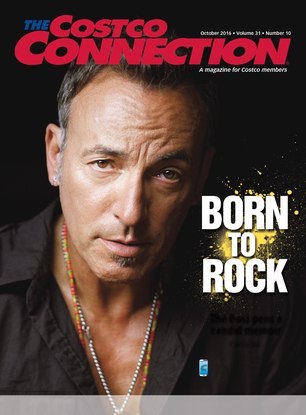
For me, one of the things I enjoy the most about these Throwback Thursday blog posts is the chance to look back at what we were thinking at various points on the curve. For today’s #TBT post, it’s a five-year rewind to October 2016.
I can tell you we weren’t thinking about a pandemic. But we were talking about music passion – and how it transcends the gadgets of the moment. In the spotlight, it’s Bruce Springsteen. Back then, he was hawking his memoirs, making the rounds for various media and publications. Bruce offers up some great quotes about today’s teens – the distraction of our modern times vs. how many of us discovered our love for music in a different decade.
There’s also an interesting side conversation about the state of Alternative music. In October of 2016, I was describing a format “trying to rekindle its momentum.” Five years later and its déjà vu all over again.
Bruce is usually a great interview, and the story highlighted in this post is ironically from Costco’s magazine, The Costco Connection. Apparently, good things come in bulk.
These days, you can read some truly great stories in some of the most unusual places. For example, I love browsing Delta’s Sky magazine, one of the most entertaining publications in the commercial aviation industry.
And there’s the Costco Connection, the monthly magazine Costco sends to its millions of members. This month, the cover story is “Born To Run,” an interview with Bruce Springsteen by Tim Talevich. The Boss is plugging his memoirs, and gave the big box store one of hundreds of interviews he’s done in the past few months.
But this is a good one. Talevich writes a strong story about Springsteen, but the money quote comes at the very end of the feature – a statement about music passion that has stuck with me since reading the story:
“I think for people from our generation that (rock) has played a very, very shaping and very powerful role. While I still believe it plays that role in young people’s lives, I think there’s a lot of other things that compete with it – the video games, so many other things. But for us, I mean music was everything.
“It was how you shaped your identity. It was how you chose your friends. You woke up to it in the morning and went to sleep with it at night. And it always pointed toward a bigger world and other possibilities.”
And by extension, Springsteen is likely talking about the role radio played in the life and times of his generation – Baby Boomers. Yet even among today’s Millennials who have all those distractions – the Internet, smartphones, social media – music delivered on the radio can still play an important role for consumers of all ages. And in any format.
Last week, I was asked by a reader of this blog if Classic Rock is a song-driven format or an artist-driven one. My feeling is that it’s more the latter.  Classic Rock fans tend to revere and appreciate artists, and generally enjoy hearing catalog songs from their favorite bands. The Classic Hits format, on the other hand, tends to be more about hit songs and less about the bands and artists who recorded them. But oftentimes, the success that both formats enjoy is wrapped up in the pure passion the airstaff delivers day in and day out when presenting the music they play.
Classic Rock fans tend to revere and appreciate artists, and generally enjoy hearing catalog songs from their favorite bands. The Classic Hits format, on the other hand, tends to be more about hit songs and less about the bands and artists who recorded them. But oftentimes, the success that both formats enjoy is wrapped up in the pure passion the airstaff delivers day in and day out when presenting the music they play.
The best Classic Rock jocks – and there are many of them around the country – are the ones who deliver the music with pure unbridled passion. We see and hear about it all the time in quantitative surveys, as well as in focus and listener groups we conduct. On the other hand, stations and jocks on auto-pilot often fail to ignite the joy for music that Springsteen speaks about.
In an environment where consumers construct their playlists or let an algorithm do the heavy lifting, the passion factor is sorely missing. Spotify, Pandora, and others are mechanical platforms that cannot replicate the personal connection that radio can deliver between the music for the fans who live for it.
And while The Boss’ formative experience was with rock music, a station’s embrace of the music has an impact with other formats, too. Right now, Alternative is trying to rekindle its momentum. After a nice long run, many stations are struggling. This prompted Richard Sands, publisher of the always entertaining The Sands Report, to launch a multi-issue series by asking the question, “What Is The Problem (If Any) With Alternative Radio?”
In the first issue, industry pundits talked about the ratings malaise that many Alternative and Active Rock stations are encountering. And some pointed to the music and the way it’s being selected and programmed as the culprit. But the final word went to a record promo exec who also laid the blame on the variables that radio can control:
“I think the problem is lazy presentation and lack of spirit. In other words, boring radio. Not the words you want to associate with a youth-based format.”
Perhaps all these decades of music testing, sorting, and scheduling have commoditized the music to a point where programmers and personalities have reduced songs into bite-sized marketing statements – the powers, the secondaries, and the fillers – rather than as the mini-passion plays they are for fans.
And so we end up back where we started – with the person behind the mic having a major say in the way the music comes alive. And I suspect that Springsteen would concur that the shaping effect he speaks of about the music was engineered by some of the seminal DJs who played it. Alternative radio is no different.
And perhaps it’s presentation that helps connect fans with music in many formats, from Christian to Hip-Hop. While I would never claim to have any expertise in Country, it makes you wonder if that format’s current travails don’t have a little something to do with the perfunctory, ho-hum delivery common to so many stations. Listeners want to be energized by their favorite stations. For most, it starts with the music.
As my friend Tom Bender used to explain it, a PD and an airstaff’s central obligation is to hold up the mirror to the audience and at minimum, reflect back their passion for the music your station plays. As we watch formats go up and down during the course of a year, the way jocks fan those flames can be a difference maker. I always take it as a good sign when I walk by the air studio, and hear the music blaring. Extra credit for dancing in the studio, playing air guitar, and singing along with the songs.
That’s the passion factor, and who else but Bruce Springsteen to explain how and why it works.
- Media And Technology In 2025: Believe It Or Not! - April 18, 2025
- In Radio, You Just Never Know - April 17, 2025
- The Secret To Making A Great Podcast (And Great Radio) - April 16, 2025





Fascinating. Human Passion cerates the Overall Sound. Best sound wins. Thank you for spotlighting The Boss.
One of my all-time music heroes, Clark. Thanks!
Passion always wins – whether you are talking about a favorite song, artist or car, the passion and interest always shows though.
Unfortunately, in the effort to homogenize and ‘streamline’ staff and workflow, many stations have simply taken the lazy approach of do what the computer says. And computers have no passion.
Hard not to be nodding at your comment, Paul.
Fred,
Those of us who loved music growing up were inspired by radio to dig deeper, read sleeve notes, pay attention to artist interviews, and in my case, consume endless music press. But that passion ran into research, bean-counters, and corporate radio. Here in Boston, both WBCN and WFNX held regular music meetings, where everyone wanted to find the next thing. Unfortunately, we thought it was like this everywhere, and that it would last. Of course today “BCN, “FNX, and even “AAF no longer exist. Passion is a blessing and a curse.
As for memoirs, I know this will be unpopular, but I found the Bruce story underwhelming and pedestrian, even though it was told very well. He’d done a million interviews, reissued many albums, then did his one-man show, selling the same stories and songs over and over. He is still America’s greatest living rocker, but enough is enough. My personal recommendations would be Willie Dixon’s, Quincy Jones’, Robbie Robertson’s or Dave Davies’ memoirs. These books not only are extremely revealing, but they explain histories none of us will ever live to tell. Covid gave me the time and energy to read dozens of these books, and they are endlessly fascinating.
I can see how some may be a bit bent out of shape by your Bruce comment, Tai. I’m not one of them. I didn’t read his memoir either. In general, I prefer to enjoy an artist through their music, and not the written word. I read Donald Fagen’s bio a few years ago. He’s one of my favorite artists, but after reading his stories (many of which seemed Petty), I just wanted to listen to “Nightfly” and forget about it.
In Bruce’s case, the stories he used to tell when teeing up a song were rich and priceless. And that day at Costoco, I probably bought a year’s supply of yellow mustard. 🙂
Timeless- thanks !
I’ve worked with many programming pros over the years, and I’m hard-pressed to think of another as focused on what was right and good about the music as you, Tom. Thanks for always setting a great example.
My passion for music led me to build an experimental AM radio station, based on a Popular Mechanics book project in 1975.
I didn’t know anything about radio. I just wanted to brag in front of my neighbors with the records I had.
In order to talk about the music, and without having a mixer, I invented a series of connections between 2 cassette recorders. In this way, I was able to record my first show.
My best friend and neighbor, Donnie Miranda, with whom I made radio for 13 years, urged me to take that cassette to a new radio station that had just been launched in my town.
I was very shy and did not want to take that program to the radio station, but Donnie convinced me.
Incredibly, they liked that program so much that it was on the air that very night, and thus began my radio career, which I have maintained for more than 45 years.
Tito, it all about passion and commitment, as your comment shows. Thanks for engaging with this post, and congrats on your long career in radio.